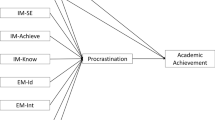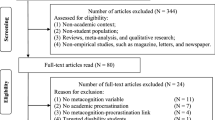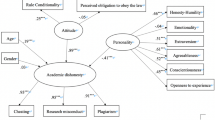Abstract
Procrastination is a common phenomenon among young people today in all aspects of their daily lives (Bakar and Khan Journal of Education and Learning (EduLearn), 10, 265–274 2016). The current literature has tended to focus on passive procrastination, while less attention was paid to active procrastination. Despite Bui’s (Journal of Social Psychology, 147, 197–209, 2007) call for additional empirical studies on active procrastination, researchers have simply acknowledged the presence of such an adaptive type of procrastination behavior without further examining its related constructs. Therefore, this study examines both active and passive procrastination to identify the personality traits that affect (active and passive) procrastination and to compare and contrast this relationship between males and females. Results showed different types of personality traits play different roles in these two forms of procrastination in different gender groups.


Similar content being viewed by others
References
Bakar, Z. A., & Khan, M. U. (2016). Relationships between self-efficacy and the academic procrastination behaviour among university students in Malaysia: A general perspective. Journal of Education and Learning (EduLearn), 10(3), 265–274.
Boysan, M., & Kiral, E. (2017). Associations between procrastination, personality, perfectionism, self-esteem and locus of control. British Journal of Guidance & Counselling, 45(3), 284–296.
Bui, N. H. (2007). Effect of evaluation threat on procrastination behavior. Journal of Social Psychology, 147(3), 197–209. https://doi.org/10.3200/socp.147.3.197-209.
Caprara, G. V., Barbaranelli, C., Borgogni, L., & Steca, P. (2003). Efficacy beliefs as determinants of teachers’ job satisfaction. Journal of Educational Psychology, 95(4), 821–832. https://doi.org/10.1037/00220663954821.
Choi, J. N., & Moran, S. V. (2009). Why not procrastinate? Development and validation of a new active procrastination scale. Journal of Social Psychology, 149(2), 195–211. https://doi.org/10.3200/socp.149.2.195-212.
Chowdhury, S. (2016). The construct validity of active procrastination: Is it procrastination or purposeful delay? Unpublished doctoral dissertation, Carleton University, Ottawa, Canada.
Chowdhury, S. F., & Pychyl, T. A. (2018). A critique of the construct validity of active procrastination. Personality and Individual Differences, 120(1), 7–12. https://doi.org/10.1016/j.paid.2017.08.016.
Chu, A. H. C., & Choi, J. N. (2005). Rethinking procrastination: Positive effects of “active” procrastination behavior on attitudes and performance. Journal of Social Psychology, 145(3), 245–264. https://doi.org/10.3200/socp.145.3.245-264.
Cumberland-Li, A., Eisenberg, N., & Reiser, M. (2004). Relations of young children’s agreeableness and resiliency to effortful control and impulsivity. Social Development, 13(2), 193–212. https://doi.org/10.1111/j.1467-9507.2004.000263.x.
De Feyter, T., Caers, R., Vigna, C., & Berings, D. (2012). Unraveling the impact of the Big Five personality traits on academic performance: The moderating and mediating effects of self-efficacy and academic motivation. Learning and Individual Differences, 22(4), 439–448. https://doi.org/10.1016/j.lindif.2012.03.013.
Endler, N. S., & Parker, J. D. A. (1990). Multi dimensional assessment of coping: A critical review. Journal of Personality and Social Psychology, 58, 844–854.
Ferrari, J. R. (2001). Procrastination as self-regulation failure of performance: Effects of cognitive load, self-awareness, and time limits on “working best under pressure”. European Journal of Personality, 15(5), 391–406.
Gallagher, P., Fleeson, W., & Hoyle, R. H. (2011). A self-regulatory mechanism for personality trait stability: Contra-trait effort. Social Psychological and Personality Science, 2, 335–342. https://doi.org/10.1177/1948550610390701.
Gupta, R., Hershey, D. A., & Gaur, J. (2012). Time perspective and procrastination in the workplace: An empirical investigation. Current Psychology, 31(2), 195–211. https://doi.org/10.1007/s12144-012-9136-3.
Habelrih, E. A., & Hicks, R. E. (2015). Psychological well-being and its relationships with active and passive procrastination. International Journal of Psychological Studies, 7(3), 25–34. https://doi.org/10.5539/ijps.v7n3p25.
Heidari, M., & Arani, M. R. (2017). Relationship between five personality factors with decision making styles of coaches. Sport Science, 10(1), 70–76.
Hensley, L. C. (2016). The draws and drawbacks of college students’ active procrastination. Journal of College Student Development, 57(4), 465–471. https://doi.org/10.1353/csd.2016.0045.
Hoyle, R. H., & Gallagher, P. (2015). The interplay of personality and self-regulation. In M. Mikulincer, P. R. Shaver, M. L. Cooper, & R. J. Larsen (Eds.), APA handbooks in psychology. APA handbook of personality and social psychology, Vol. 4. Personality processes and individual differences (pp. 189–207). Washington, DC: American Psychological Association.
Kandemir, M., İlhan, T., Özpolat, A. R., & Palanci, M. (2014). Analysis of academic self-efficacy, self-esteem and coping with stress skills predictive power on academic procrastination. Educational Research and Reviews, 9(5), 146–152. https://doi.org/10.5897/err2014.1763.
Karatas, H. (2015). Correlation among academic procrastination, personality traits, and academic achievement. Anthropologist, 20(1), 243–255.
Karataş, H., & Bademcioglu, M. (2015). The explanation of the academic procrastination behaviour of pre-service teachers with five factor personality traits. The International Journal of Research in Teacher Education, 6(2), 11–25. https://doi.org/10.1016/j.sbspro.2010.03.292.
Karwowski, M., Lebuda, I., Wisniewska, E., & Gralewski, J. (2013). Big Five personality traits as the predictors of creative self-efficacy and creative personal identity: Does gender matter? Journal of Creative Behavior, 47(3), 215–232. https://doi.org/10.1002/jocb.32.
Kim, S., Fernandez, S., & Terrier, L. (2017). Procrastination, personality traits, and academic performance: When active and passive procrastination tell a different story. Personality and Individual Differences, 108, 154–157. https://doi.org/10.1016/j.paid.2016.12.021.
Klassen, R. M., Krawchuk, L. L., & Rajani, S. (2008). Academic procrastination of undergraduates: Low self-efficacy to self-regulate predicts higher levels of procrastination. Contemporary Educational Psychology, 33(4), 915–931. https://doi.org/10.1016/j.cedpsych.2007.07.001.
Klingsieck, K. B. (2013a). Procrastination in different life-domains: Is procrastination domain specific? Current Psychology, 32(2), 175–185.
Klingsieck, K. B. (2013b). Procrastination: When good things don’t come to those who wait. European Psychologist, 18(1), 24–34. https://doi.org/10.1027/1016-9040/a000138.
Lay, C. H. (1988). The relationship of procrastination and optimism to judgments of time to complete an essay and anticipation of setbacks. Journal of Social Behavior and Personality, 3(3), 201–214.
Lay, C. H. (1997). Explaining lower-order traits through higher-order factors: The case of trait procrastination, conscientiousness, and the specificity dilemma. European Journal of Personality, 11(4), 267–278. https://doi.org/10.1002/(SICI)1099-0984(199711)11:4<267::AID-PER281>3.0.CO;2-P.
Lindt, S. F., Corkin, D. M., & Yu, S. I. (2014). Using multiple methods to distinguish active delay and procrastination in college students. American International Journal of Contemporary Research, 4(2), 28–32.
Liu, W., Pan, Y., Luo, X., Wang, L., & Pang, W. (2017). Active procrastination and creative ideation: The mediating role of creative self-efficacy. Personality and Individual Differences, 119, 227–229. https://doi.org/10.1016/j.paid.2017.07.033.
Mandap, C. M. (2016). Examining the differences in procrastination tendencies among university students. International Journal of Education and Research, 4(4), 431–436.
Matthews, G., Schwean, V. L., Campbell, S. E., Saklofske, D. H., & Mohamed, A. A. (2000). Personality, self-regulation, and adaptation: A cognitive-social framework. In M. Boekarts, P. R. Pintrich, & M. Zeidner (Eds.), Handbook of self-regulation (pp. 171–207). New York: Academic.
McCown, W., Johnson, J., & Petzel, T. (1989). Procrastination, a principal components analysis. Personality and Individual Differences, 10(2), 197–202. https://doi.org/10.1016/0191-8869(89)90204-3.
McCrae, R. R., & Löckenhoff, C. E. (2010). Self-regulation and the Five-Factor Model of personality traits. In R. H. Hoyle (Ed.), Handbook of personality and self-regulation (pp. 145–168). Malden: Wiley-Blackwell. https://doi.org/10.1002/9781444318111.ch7.
Nadeem, M., Malik, A. A., & Javaid, F. (2016). Link between personality traits and procrastination among university students. Journal of Educational Research, 19(2), 92–104.
Nasab, N. F., & Mohammadi-Aria, A. (2015). The predictive role of religious beliefs and psychological hardiness in academic procrastination of high school students (Dalgan). International Research Journal of Applied and Basic Sciences, 9, 1082–1087.
Özer, B. U. (2011). A cross sectional study on procrastination: Who procrastinate more? International Conference on Education Research and Innovation, 18, 34–37.
Pychyl, T. A., & Flett, G. L. (2012). Procrastination and self-regulatory failure: An introduction to the special issue. Journal of Rational-Emotive & Cognitive-Behavior Therapy, 30(4), 203–212. https://doi.org/10.1007/s10942-012-0149-5.
Rodarte-Luna, B., & Sherry, A. (2008). Sex differences in the relation between statistics anxiety and cognitive/learning strategies. Contemporary Educational Psychology, 33(2), 327–344. https://doi.org/10.1016/j.cedpsych.2007.03.002.
Scheier, M. F., & Carver, C. S. (1992). Effects of optimism on psychological and physiological well-being: Theoretical overview and empirical update. Cognitive Therapy and Research, 16, 210–228.
Seo, E. H. (2013). A comparison of active and passive procrastination in relation to academic motivation. Social Behavior and Personality, 41(5), 777–786. https://doi.org/10.2224/sbp.2013.41.5.777.
Steel, P. (2007). The nature of procrastination: A meta-analytic and theoretical review of quintessential self-regulatory failure. Psychological Bulletin, 133(1), 65–94. https://doi.org/10.1037/0033-2909.133.1.65.
Steel, P., & Klingsieck, K. B. (2016). Academic procrastination: Psychological antecedents revisited. Australian Psychologist, 51(1), 36–46. https://doi.org/10.1111/ap.12173.
Strongman, K. T., & Burt, C. D. (2000). Taking breaks from work: An exploratory inquiry. Journal of Psychology, 134(3), 229–242. https://doi.org/10.1080/00223980009600864.
Tang, H., Li, X. H., & Wang, G. H. (2015). A view of Big Five personality traits related to active procrastination in college students. Journal of Sichuan Vocational and Technical College, 25(1), 90–92.
Weisberg, Y. J., DeYoung, C. G., & Hirsh, J. B. (2011). Gender differences in personality across the ten aspects of the Big Five. Frontiers in Psychology, 2, Article 178. https://doi.org/10.3389/fpsyg.2011.00178.
Zhou, M. (2015). Moderating effect of self-determination in the relationship between Big Five personality and academic performance. Personality and Individual Differences, 86, 385–389. https://doi.org/10.1016/j.paid.2015.07.005.
Author information
Authors and Affiliations
Corresponding author
Ethics declarations
Conflict of Interest
There is no conflict of interest.
Ethical Approval
The procedure performed in this study involving human participants was in accordance with the ethical standards of the institutional and/or national research committee and with the 1964 Helsinki declaration and its later amendments or comparable ethical standards.
Informed Consent
Informed consent was obtained from all individual participants included in the study.
Rights and permissions
About this article
Cite this article
Zhou, M. Gender differences in procrastination: The role of personality traits. Curr Psychol 39, 1445–1453 (2020). https://doi.org/10.1007/s12144-018-9851-5
Published:
Issue Date:
DOI: https://doi.org/10.1007/s12144-018-9851-5




